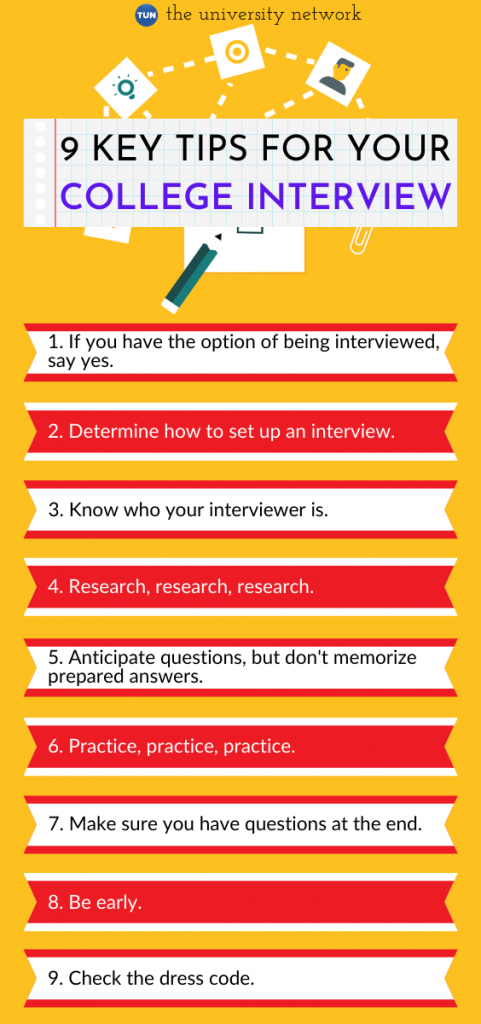If you’re applying to a selective university, you may be asked to take part in an admissions interview. While this can feel like a daunting task, particularly for the introverts out there, it’s really an exciting opportunity to set yourself apart from a crowded pool of applicants.
In the grand scheme of things, interviews don’t make that big of a difference. In terms of impacting your chances of being admitted to your choice college, interviews don’t usually carry nearly as much weight as your GPA or curriculum choices, for example. However, you don’t want to go into an interview unprepared, as you need to leave a good impression.
Below, we’ve created a list that highlights all of the important information you need to know before you sit down for your interview. That way, you can go in comfortable and ready to impress.
1. If you have the option of being interviewed, say yes
Few colleges and universities mandate that all applicants partake in interviews. Even Harvard and Yale, for example, “recommend” interviews rather than “require” them. At other institutions, such as Northwestern and Stanford, interviews are considered “optional.”
But if you’re given the chance to be interviewed and are able to do so, you should always say yes. Interviews are your opportunity to leave a lasting impression on your interviewer and boost your chances of admittance.
Although interviewers don’t independently decide whether or not you’re admitted, they will relay information about your personality, interests, passions, and goals back to admissions officers. The more good things they have to say, the higher your chances of getting in are!
Your interviewer is also evaluating you for your level of interest in the school you’re applying to. It’s worth noting that you don’t want to be in the group of students who opted not to interview, as that may be perceived as a lack of interest in a school.
If you are truly unable to arrange an interview, however, most admissions offices won’t hold that against you. Harvard’s admissions website, for example, states, “If an interview cannot be arranged, you will not be at a disadvantage during the application process.”
2. Determine how to set up an interview
Schools vary in terms of their standards for setting up interviews. So, it’s really important to check the individual policies of each school you’re applying to.
Some institutions, like Harvard and MIT, for example, reach out to applicants after applications are submitted to set up an interview time and place. Of course, amid the COVID-19 pandemic, most schools are currently planning to conduct interviews online.
But other institutions, such as Washington and Lee University, ask applicants to set up interviews on their own. Typically, this is as simple as following a few directions on an admissions website. The only thing you need to be cautious about is making sure you schedule an interview before the deadline. Schools have various deadlines that may be lined up with what time of year you opt to apply.
In most cases, you’ll be able to find all the information you need through a quick Google search. But if you’re having trouble finding updated information regarding how to set up an interview, you can always reach out to an admissions office by calling or sending an email.
3. Know who your interviewer is
Most often, your interviewer will be an alumni of the school you’re applying to. Alumni networks usually extend across the country, and those who volunteer to conduct interviews will often meet applicants in public spaces near where they live, like coffee shops, restaurants, or libraries. This year, though, most interviews will be virtual due to the COVID-19 pandemic.
Notably, alumni who give up their free time to interview applicants are typically very enthusiastic about their alma mater and want to make sure all of those who are admitted will be a good fit and are as passionate about the school as they are. So, if you’re interviewing with an alumni, make sure you come to the interview full of excitement, knowledge, and enthusiasm.
In some cases, however, you’ll be asked to interview with an admissions officer. This won’t change the weight your interview carries in terms of affecting your likelihood of being admitted. And it should not significantly affect the way in which you approach your interview.
4. Research, research, research
You should never go into an interview unprepared. Throughout the weeks leading up to your interview, take some time to further research the institution you’re interviewing for.
Conduct a thorough investigation, like you’re being tested on it. Going into the interview, you should know the majors the school offers, the most storied alumni, the campus locations, and even the mascot! You get the picture.
The point is, you want to be able to provide detailed and honest answers to every question you’re asked and be able to prove to your interviewer that you’re passionate about the institution.
Go above and beyond to impress. Make the interviewer believe that this school is the only one you’re interested in. By demonstrating your vast knowledge of the school, you make it clear that it would be a huge disappointment to attend anywhere else.
5. Anticipate questions, but don’t memorize prepared answers
Before your interview, you’ll want to do some research on the types of questions you might be asked. Some schools, such as Yale, offer a set of sample questions online that students can check out before their interview.
Those who apply to Yale, for example, may be asked these general questions.
- What has made you stick with an interest for years?
- Tell me about an influential person in your lives (teacher, coach, etc.).
- What do you do for fun?
- What do you hope to gain from your undergraduate experience?
Additionally, if you’ve already decided on a major or have portrayed a strong interest in, say, theater, writing, traveling, or music, you may be asked some questions that are specific to your field of study or interest. Your answers to these questions, however, should come naturally.
Yale suggests that interviewers may ask “theater buffs,” for example, these following questions.
- What are some of your favorite roles? What is it like for you when you are performing on stage?
- Is there a character you’d really like to play? Is there a show you’d really like to direct?
- What can theater offer that other performance forms don’t? What are its possibilities?
And “the writer” might be asked these questions.
- What do you like to write? Fiction, non-fiction, poetry?
- Do you have favorite subjects you like to write about? Why?
- Where do you gather your subject matter? What inspires your writing?
- Have you had a chance to share your writing with an audience?
Overall, familiarizing yourself with some potential questions is a good idea. You should absolutely check if the school you’re applying to has sample questions online like Yale does. But, you should never go into an interview with a memorized list of responses, or you’ll not come across as authentic.
Think of your interview as a conversation. The interviewer will often ask follow-up questions based on your last response. You want to be able to think on the spot and answer questions naturally. This is only possible, though, if you’ve done your research before going into the interview.
6. Practice, practice, practice
The best way to feel prepared for an interview is to practice extensively beforehand. While answering questions in the mirror is better than nothing, the best thing to do is to ask your parent, sibling, or friend to sit down with you and conduct a mock interview.
If the college you’re interviewing for has a list of questions online, like Yale does, print those questions out and have your practice partner ask questions from that sheet. Running through mock interviews will help you become familiar and comfortable with the interview process.
You’ll be able to recognize and fix any technical problems like saying “um” or “like” too many times. And you’ll be able to get a sense of how prepared you truly are. This will help you determine if you need to go back and do some more research.
7. Make sure you have questions at the end
At the end of your interview, your interviewer will likely ask you if you have any questions. This is not the time to shrug your shoulders and murmur “no, I think I’ve got it.”
Use this as your opportunity to spark an engaging conversation with your interviewer that portrays your true interest in the school.
Prove you’ve done your research by asking questions that you really want to know the answers to. If you’re interested in your life after college, for example, ask about the strength of the school’s alumni network. Or, if you’re passionate about rugby, for example, ask about the strength of the club team and if there are people on campus who share your passion for the sport.
Even if the interviewer doesn’t have the answer to your question, this will give the interviewer more insight into who you are, apart from your test scores. And, chances are, they’ll be able to point you in the direction of someone who does know the answers.
That said, you don’t want to ask meaningless, Googleable questions like “what’s the total enrollment?” or “would I be able to major in math?”
Your interviewer is spending their valuable time on you, and you don’t want to waste it by asking simple questions because you’re too lazy to research it on your own. It also signals that you haven’t done your research.
8. Be early
Be present and ready for your interview at least 15 minutes before the actual start time. If you’re driving somewhere 20 minutes away, give yourself at least 35 minutes. Or if your interview is on Skype or Zoom, sit down at your computer 15 minutes early.
Not only will this give you some extra time in case you run into traffic or have technical problems with your computer, but it will also give you a moment to take a deep breath, calm down, and collect your thoughts before the interview.
9. Check the dress code
A Google search will tell you that most colleges and universities, including MIT, do not require applicants to dress up for the interview. But that doesn’t mean you should wear shorts and a hoodie.
Be presentable. If the school you’re applying to doesn’t specify how to dress, wear what you may consider to be “business casual.” Don’t wear a suit, and you can probably lose the tie. Look good, but comfortable.
If you’re going somewhere to meet an interviewer, try to match your attire with the location. Showing up to a coffee shop in a full suit, for example, might make an interviewer feel uncomfortable, but so would your gym clothes.
Conclusion
Sitting down, one-on-one, with someone you don’t know who may influence your chances of being admitted to your dream school can, without a doubt, feel scary. But the more prepared and confident you are, the more your fears will wash away. Following the tips in this article and preparing extensively will help you develop confidence. Naturally, you will become excited and ready to impress.




